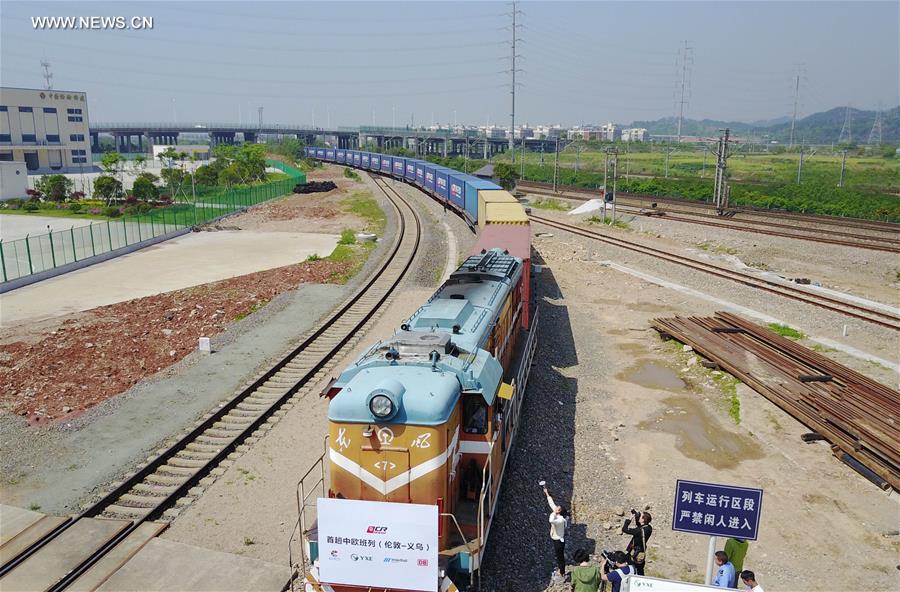New group in UK making inroads for BRI and CPEC
- By Daniel Hyatt
 0 Comment(s)
0 Comment(s) Print
Print E-mail China.org.cn, September 28, 2018
E-mail China.org.cn, September 28, 2018

As the date for Brexit nears, the United Kingdom is gearing up for revision of its trade policies. At the same time, China's Belt and Road Initiative (BRI) is offering unparalleled connectivity of industries with global markets and arousing the interest of British parliamentarians.
One British lawmaker of Pakistani descent has taken the lead in educating his fellow legislators on BRI and its flagship project, the China Pakistan Economic Corridor (CPEC).
Faisal Rashid, former mayor of Warrington who now represents the town at the House of Commons, visited China last year and realized the scope of the BRI and its associated investments hold for the post-Brexit U.K. On his return, he has helped share his knowledge of this mega venture with other parliamentarians.
Earlier this month, he launched the All-Party Parliamentary Group (APPG) for the BRI and CPEC in a ceremony attended by Liu Xiaoming, Chinese ambassador to the U.K. The group aims to bring a better understanding of the two intertwined projects to British parliamentarians through regular events like round-table discussions, meetings and networking sessions.
According to Rashid, the ideal way to educate British politicians on the BRI is by bringing details of the group to every parliamentarian. The group has so far had an encouraging response, with interest shown by over 40 politicians. Now it intends to circulate information regarding its activities to all 650 MPs and 800 peers at the House of Lords.
CPEC has already received constructive feedback from the U.K. A number of officials, including former Foreign Secretary Boris Johnson, Mayor of London Sadiq Khan and British PM's trade envoy to Pakistan Rehman Chishti have expressed their government's desire to support the CPEC. In the words of Greg Hands, former minister of State for International Trade, "Britain is a country of global influence and can be an important partner for China and Pakistan in the delivery of the China-Pakistan Economic Corridor."
The BRI, as stated by Faisal Rashid, is an opportunity for the post-Brexit U.K. The country is aiming to increase engagement in international trade activities and with the recently introduced concept of "Global Britain," it can reach remote markets using the land and sea-based connectivity that the BRI extends. The BRI's facilities can even be utilized to achieve Prime Minister Theresa May's plans of expanding the U.K.'s trade footprint.
The "Global Britain" approach also negates the ongoing protectionist waves being observed in international trade. The U.K. and China can pursue the common goal of trade multilateralism, considering the fact that both desire globalized economies.
The U.K. has been a dominant player in global trade during a major part of the last two centuries. The country's trade priorities during its association with the EU can now be realigned with the government's new economic objectives. It will have increased leverage to engage in the BRI since Theresa May clearly stated during her visit to China earlier this year that "once Britain leaves the EU, [it] will be free to strike [its] own trade deals." The BRI can thus be considered a vessel that has the capacity to expand Britain's economy.
The highly developed legal and consultancy sector and the advantage of the English language give the U.K. a natural edge. Ease of doing business will be much greater as the U.K. has been trading with BRI participating countries for centuries.
China and the U.K. are building a comprehensive strategic partnership for the 21st century – dubbed a "Golden Era" of the two countries' relations. Since its launch in 2015, the move has increased political trust and boosted bilateral cooperation in several sectors. Besides, it is developing a consensus on the BRI and translating it into concrete actions, according to Liu Xiaoming.
The possibility of a free trade agreement between the two is getting closer to reality which can come into effect after the U.K.'s departure from the EU. Last month's conference of China-U.K. Joint Economic and Trade Commission saw concrete discussions that indicate an improvement in bilateral investments and services trade.
Meanwhile, it is important to engage the public and private sector entities of the U.K., China, and Pakistan to collaborate under the BRI. Located in the U.K., the APPG can encourage trilateral projects. With positive signals spawning from all governments, investment cooperation among them will expand after private and state-owned enterprises start engaging in such projects. A major activity planned by the APPG in this regard is the frequent interaction of businesses and governments from the three countries.
The APPG on the BRI and CPEC has immense potential. In addition to delivering reports on opportunities, it will highlight how the BRI affects different parts of the world. Its activities are expected to project an impartial picture of the BRI to Western players, subsequently translating into a positive perception of the mega project's promises.
Daniel Hyatt is a Pakistan-based freelance journalist and commentator.
Opinion articles reflect the views of their authors, not necessarily those of China.org.cn.






Go to Forum >>0 Comment(s)